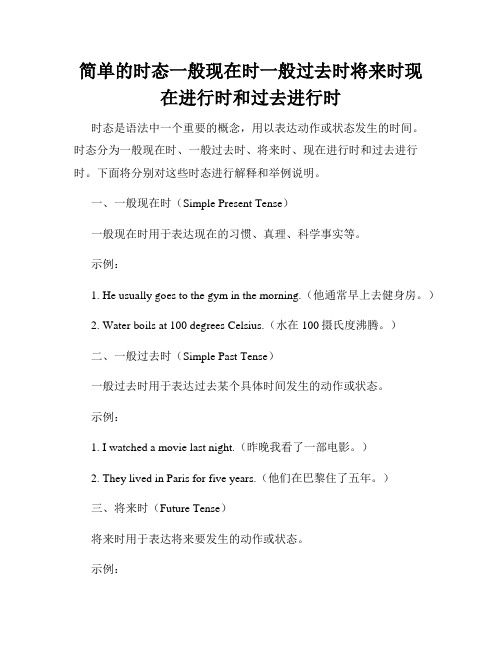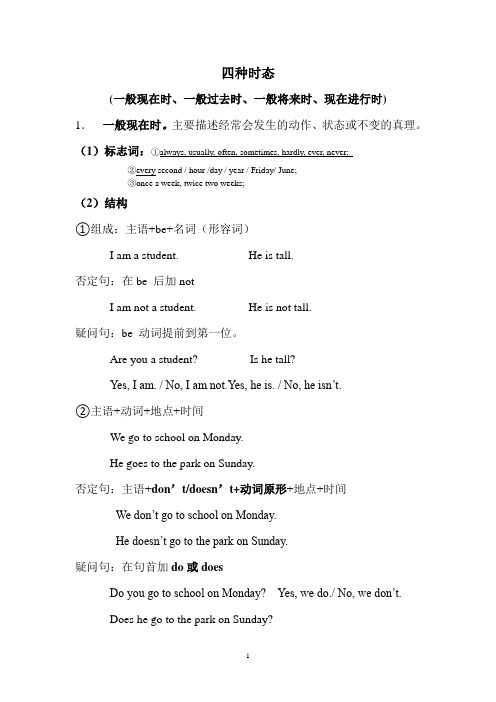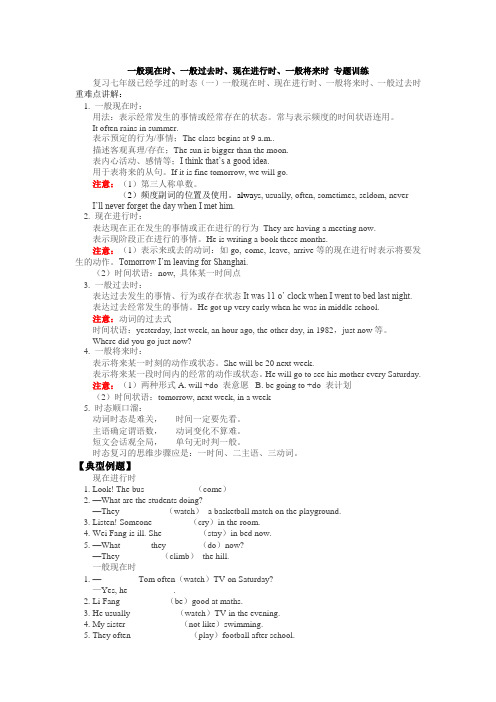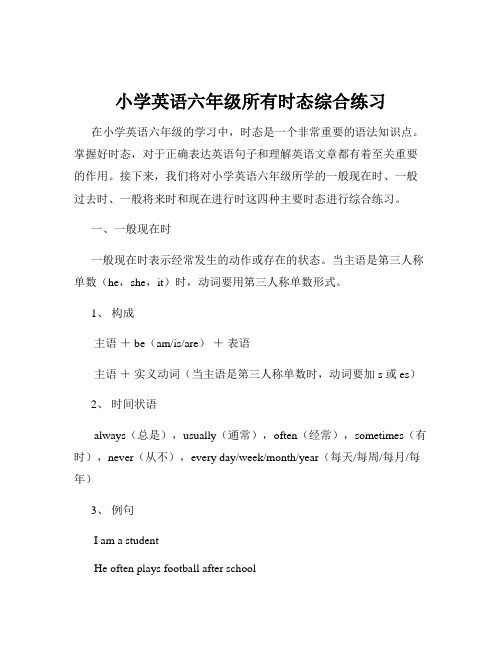时态综合练习——一般现在时、一般将来时、现在进行时知识分享
知识点时态综合练习

知识点时态综合练习一、时态综合练习时态是英语中非常重要的语法知识点之一,掌握时态的正确使用对于提高语言表达和沟通能力至关重要。
本文将对英语中常见的时态进行综合练习,帮助读者深入理解并正确运用时态。
1. 一般现在时一般现在时表示经常性的动作、习惯、客观事实等。
常与频率副词(often, sometimes, usually等)连用。
例句:I often play football with my friends on weekends.2. 现在进行时现在进行时表示正在进行的动作,常与现在进行时的标志词(now, at the moment)连用。
例句:She is studying in the library right now.3. 一般过去时一般过去时表示过去某个时间里发生的动作或者存在的状态。
例句:They visited their grandparents last weekend.4. 过去进行时过去进行时表示过去某个时间段内正在进行的动作。
例句:He was cooking dinner when the phone rang.5. 一般将来时一般将来时表示将来某个时间将要发生的动作或者存在的状态。
例句:I will call you later today.6. 现在完成时现在完成时表示过去发生的事情对现在造成的影响或者结果。
例句:He has already finished his homework.7. 过去完成时过去完成时表示过去某个时间或动作之前已经发生的动作或状态。
例句:She had already left when I arrived.8. 将来进行时将来进行时表示将来某个时间段内正在进行的动作。
例句:I will be traveling to London next week.9. 现在完成进行时现在完成进行时表示过去某个时间开始并一直持续到现在的动作。
例句:They have been working on this project for two months.10. 过去完成进行时过去完成进行时表示过去某个时间开始并一直持续到过去某个时间的动作。
简单的时态一般现在时一般过去时将来时现在进行时和过去进行时

简单的时态一般现在时一般过去时将来时现在进行时和过去进行时时态是语法中一个重要的概念,用以表达动作或状态发生的时间。
时态分为一般现在时、一般过去时、将来时、现在进行时和过去进行时。
下面将分别对这些时态进行解释和举例说明。
一、一般现在时(Simple Present Tense)一般现在时用于表达现在的习惯、真理、科学事实等。
示例:1. He usually goes to the gym in the morning.(他通常早上去健身房。
)2. Water boils at 100 degrees Celsius.(水在100摄氏度沸腾。
)二、一般过去时(Simple Past Tense)一般过去时用于表达过去某个具体时间发生的动作或状态。
示例:1. I watched a movie last night.(昨晚我看了一部电影。
)2. They lived in Paris for five years.(他们在巴黎住了五年。
)三、将来时(Future Tense)将来时用于表达将来要发生的动作或状态。
示例:1. We will have a meeting tomorrow.(我们明天要开会。
)2. She is going to travel to Japan next month.(她下个月将要去日本旅行。
)四、现在进行时(Present Continuous Tense)现在进行时用于表达正在进行的动作。
示例:1. They are watching TV at the moment.(他们此刻正在看电视。
)2. She is studying for her exam right now.(她正在复习考试。
)五、过去进行时(Past Continuous Tense)过去进行时用于表达过去某一时刻正在进行的动作。
示例:1. I was reading a book when she called.(她给我打电话的时候,我正在看书。
四种时态及其练习(完整版)

四种时态(一般现在时、一般过去时、一般将来时、现在进行时)1.一般现在时。
主要描述经常会发生的动作、状态或不变的真理。
(1)标志词:①always, usually, often, sometimes, hardly, ever, never;②every second / hour /day / year / Friday/ June;③once a week, twice two weeks;(2)结构①组成:主语+be+名词(形容词)I am a student. He is tall.否定句:在be 后加notI am not a student. He is not tall.疑问句:be 动词提前到第一位。
Are you a student? Is he tall?Yes, I am. / No, I am not.Yes, he is. / No, he isn’t.②主语+动词+地点+时间We go to school on Monday.He goes to the park on Sunday.否定句:主语+don’t/doesn’t+动词原形+地点+时间We don’t go to school on Monday.He doesn’t go to the park on Sunday.疑问句:在句首加do或doesDo you go to school on Monday? Yes, we do./ No, we don’t.Does he go to the park on Sunday?Yes, he does./ No, he doesn’t.(3)动词三单变化:①在原单词末尾加s , 如:like –likes②单词以o, sh, ch, s, x 结尾加es, 如:go –goes③单词末尾为辅音+y结尾去y加ies 如:study- studies2. 现在进行时:主要叙述正在发生的事情。
一般将来时、一般现在时、一般过去时、正在进行时练习题

一般现在时、一般过去时、现在进行时、一般将来时专题训练复习七年级已经学过的时态(一)一般现在时、现在进行时、一般将来时、一般过去时重难点讲解:1. 一般现在时:用法:表示经常发生的事情或经常存在的状态。
常与表示频度的时间状语连用。
It often rains in summer.表示预定的行为/事情;The class begins at 9 a.m..描述客观真理/存在;The sun is bigger than the moon.表内心活动、感情等;I think that’s a good idea.用于表将来的从句。
If it is fine tomorrow, we will go.注意:(1)第三人称单数。
(2)频度副词的位置及使用。
alwa ys, usually, often, sometimes, seldom, never I’ll never forget the day when I met him.2. 现在进行时:表达现在正在发生的事情或正在进行的行为They are having a meeting now.表示现阶段正在进行的事情。
He is writing a book these months.注意:(1)表示来或去的动词:如go, come, leave, arrive等的现在进行时表示将要发生的动作。
Tomorrow I’m leaving for Shanghai.(2)时间状语:now, 具体某一时间点3. 一般过去时:表达过去发生的事情、行为或存在状态It was 11 o’ clock when I went to bed last night.表达过去经常发生的事情。
He got up very early when he was in middle school.注意:动词的过去式时间状语:yesterday, last week, an hour ago, the other day, in 1982,just now等。
小学英语六年级所有时态综合练习

小学英语六年级所有时态综合练习在小学英语六年级的学习中,时态是一个非常重要的语法知识点。
掌握好时态,对于正确表达英语句子和理解英语文章都有着至关重要的作用。
接下来,我们将对小学英语六年级所学的一般现在时、一般过去时、一般将来时和现在进行时这四种主要时态进行综合练习。
一、一般现在时一般现在时表示经常发生的动作或存在的状态。
当主语是第三人称单数(he,she,it)时,动词要用第三人称单数形式。
1、构成主语+ be(am/is/are)+表语主语+实义动词(当主语是第三人称单数时,动词要加 s 或 es)2、时间状语always(总是),usually(通常),often(经常),sometimes(有时),never(从不),every day/week/month/year(每天/每周/每月/每年)3、例句I am a studentHe often plays football after schoolThey are very happy练习:1、 My father ______ (watch) TV every night2、 She ______ (like) music very much3、 The children often ______ (play) in the park二、一般过去时一般过去时表示过去发生的动作或存在的状态。
1、构成主语+ was/were +表语主语+动词的过去式2、时间状语yesterday(昨天),last week/month/year(上周/上个月/去年),ago(以前),in +过去的年份3、例句I was at home yesterdayThey played basketball last weekHe went to Beijing two years ago练习:1、 We ______ (have) a party last night2、 She ______ (buy) a new dress yesterday3、 He ______ (do) his homework an hour ago三、一般将来时一般将来时表示将来要发生的动作或存在的状态。
综合时态(一般现在时、现在进行时、一般将来时、一般过去时)

综合时态一般现在时一般过去时现在进行时 概念时间标志词结构经常性、习惯性的动作频率副词:always/ usually/often/sometimese very day/week/month/yearb e 动词实义动词a m \is \are否定句:be 后加not一般疑问句:be 动词提前动词原形(非第三人称单数)三单(第三人称单数)一般疑问句:Do they like pandas?一般疑问句:Does she like pandas?概念时间标志词结构已经发生过的动作或事情y esterday \ last week 、last month 、last year实义动词概念正在发生的事或动作时间标志词n ow\ look \listen结构b e+动词ing一般将来时概念还没有发生的事情或动作时间标志词t omorrow \ next day 、next week 、next year……结构w ill +动词原形b e going to +动词原形 w as \ were一般疑问句:Was she ten years old last year?肯定句: She was ten years old last year.否定句: She was not ten years old last year.b e 后加notb e 动词提前句式肯定句:She went shopping yesterday.否定句:She didn't go shopping yesterday.动词前加didn't,一般疑问句:Did she go shopping yesterday?句前加Did注意:didn't 和did 后动词要还原成原形动词变化规则一般情况直接加ed以不发音的e 结尾加d like——liked以辅音字母加y 结尾,变y 为i 加ed study——studied以辅元辅结尾的重读闭音节结尾,双写尾字母加ed stop——stopped肯定句:They like pandas.否定句:They don't like pandas.借助don't句前加Do肯定句:She likes pandas.否定句:She doesn't like pandas.动词前加doesn't句前加Does动词ing 变化规则句式肯定句: She is reading否定句:She is not readingb e 后加notb e 后加not一般疑问句:Is she reading?b e 动词提前直接加ing不发音的e 结尾,去e 加ing以重读闭音节结尾的单词,双写尾字母加ing shop——shopping以ie 结尾,变ie 为y 加ing lie——lying肯定句: He will visit his grandmother.否定句: He will not visit his grandmother.一般疑问句: Will he visit his grandmother ?肯定句: He is going to visit his grandmother.否定句: He isn't going to visit his grandmoter.一般疑问句:Is he going to visit his grandmother? 否定句:will 或be 后加not一般疑问句 will 或be 动词提前。
时态复习精讲(一般现在时、现在进行时、将来时、过去式)
过去进行时
昨晚八点钟他在做作业。 (He was doing homework at 8 o'clock last night.)
一般将来时
明天下午我将有空。 (I will be free tomorrow afternoon.)
将来进行时
后天上午他们将在办公室工作。 (They will be working in the office the next morning.)
"be+动词-ing形式"
表示将来某个时间正在进行的动作,例如"She is coming to visit us next month."。
注意事项与常见错误
注意时态一致性:在复合句中,主句和从句的时态应 保持一致,不要混淆时态。
区分"will/shall"与"be going to"的用法:虽然两者 都可用于表示将来时,但"will/shall"强调的是意愿或 可能性,而"be going to"强调的是计划或预测。
常见句型结构
"will/shall+动词原形"
表示将来某个时间发生的动作或存在的状态,例如"I will go to the party tomorrow."。
"be going to+动词原形"
表示计划或预测将来发生的动作,例如"We are going to meet at the park next week."。
注意事项与常见错误
动词ing形式的正确使用
注意动词ing形式的拼写和语法,如 “running”而不是“runing”。
一般现在时-将来时和现在进行时的讲解与练习
一般现在时、将来时和现在进行时的讲解与练习一般现在时一、一般现在时的功能1.表示事物或人物的特征、状态。
如:The sky is blue.天空是蓝色的。
2.表示经常性或习惯性的动作。
如:I get up at six every day.我每天六点起床。
3.表示客观现实和普遍真理。
如:The earth goes around the sun.地球绕着太阳转。
二、一般现在时关键词always, usually, often, sometimes , seldom极少, hardly几乎不, never, every day(week, year, night), on Sundays, on Monday, in the evening, once/ twice/ three times a month每月一次/两次/三次三、一般现在时的构成1. be动词:主语+be(am,is,are)+其它。
如:I am a boy.我是一个男孩。
2.行为动词:主语+行为动词(+其它)。
如:We study English.我们学习英语。
当主语为第三人称单数(he, she,it)时,谓语动词要用第三人称单数,即要在动词后加"-s"或"-es"。
如:Mary likes Chinese.玛丽喜欢汉语。
四、一般现在时的变化1. be动词的变化。
①否定句:主语+ be + not +其它。
如:He is not a worker.他不是工人。
②一般疑问句:Be +主语+其它。
如:-Are you a student -Yes. I am. / No, I'm not.③特殊疑问句:疑问词+一般疑问句。
如:Where is my bike2. 行为动词的变化。
①否定句:主语+ don't( doesn't ) +动词原形(+其它)。
如:I don't like bread.当主语为第三人称单数时,要用doesn't构成否定句。
一般现在时现在进行时一般将来时一般过去时知识点总结
一般现在时现在进行时一般将来时一般过去时知识点总结一般现在时、一般将来时、一般过去时、现在进行时知识总结一、一般现在时一般现在时表示经常性或惯性的动作,常与表示频度的时间状语连用,如often, usually, always, sometimes, never, seldom, every week/day/year/month...,once a week, on Sundays等。
动词用原形。
当主语为第三人称单数时(he, she, it,一个人名),动词变为三单形式。
Be动词肯定句主语+am/is/are+其它I am a boy.否定句一般疑问句Am/is/are+主语+其它Are you a boy? Yes, I am.No, I am not.Do+主语+动词原形+其它?Do you play basketball after school everyday? Yes, we do. / No, we don't.Does+主语+动词原形+其它。
Does he swim well ? Yes, he does. / No, XXX't.非凡疑问句疑问词(where/what/ when/who/why/how)+am/is/are+主语+别的Where are you?疑问词+do+主语+动词真相+别的?What do you do afterschool everyday?主语+am/is/arenot+别的I am not aXXX.第一人主语+动词原形(+主语+don't+行称I、第其它)。
We play动词原形(+其它)。
wedon’t为二人称basketball afteryou、XXX.playbasketball动复数after schoolXXX.词第三人主语+动词三单主语+称单数式(+别的)。
doesn’t+动词真相(+其XXX.它)。
XXX’tswim well.疑问词+does+主语+动词原形+其它。
外研版八年级英语上册模块M1-一般现在时、现在进行时、一般将来时、一般过去时知识点总结—+练习
一般现在时、一般将来时、一般过去时、现在进行时知识总结一、一般现在时一般现在时表示经常性或习惯性的动作,常与表示频度的时间状语连用,如often, usually, always, sometimes, never, seldom, every week/day/year/month..., once a week, on Sundays第三人称单数的动词变化规则:(只有在第三人称(he, she, it, 一个人名)为主语的肯定句中,动词才用三单式)(1)一般情况下,直接加s:runs gets likes(2)结尾是s, x, sh, ch, o,前为辅音字母,结尾加es:watches, goes, washes, crosses, mixes, does(3)动词末尾y,前为辅音,将y改为i加es:study→studies fly→flies但在y前如果为元音则直接加s:buys says plays(4)不规则变形: have—has二、一般将来时一般将来时表示将来发生的事。
常与tomorrow, next day/week/month/year..., soon, in a few minutes, the day after tomorrow, in the future等时间状语连用。
Will/shall +动词原形;(shall用语第一人称) be(am/is/are) going to+ 动词原形三、一般过去时一般过去时表示过去某一时候或某一段时间所发生了的事情或存在的状态。
常与过去时间yesterday ,ago, this morning ,just now ,a moment ago ,last night / year / week/month ,once upon a time ,the other day,before ,the day before yesterday, in 1989, at the age of five, one day, then(那时), on that day, in the past 连用。
- 1、下载文档前请自行甄别文档内容的完整性,平台不提供额外的编辑、内容补充、找答案等附加服务。
- 2、"仅部分预览"的文档,不可在线预览部分如存在完整性等问题,可反馈申请退款(可完整预览的文档不适用该条件!)。
- 3、如文档侵犯您的权益,请联系客服反馈,我们会尽快为您处理(人工客服工作时间:9:00-18:30)。
时态综合练习——一般现在时、一般将来时、现在进行时
时态练习
1.I (go) to school by bus everyday.
2.He (go) for a walk on Sundays.
3.Su Yang (go) to a farm with her parents last weekend.
4.Let’s (go) and (see).
5.What are you (go) to do tomorrow? I’m (go) to (have) a picnic.
6.You (have) a stove and she (have) a tin-opener.
7.What time do you (have) breakfast? I (have) breakfast at a quarter past
seven.
8.What do you (have)? They (have) a blanket.
9.What are you d oing? I’m (have) an English lesson.
10.I (have) a good time yesterday.
11.What are you goi ng to do tomorrow? I’m going to (have) a picnic.
12.What do you (like)? I (like) (duck).
13.What does she (like)? She (like) (take) photos.
14.Does he like (plant) flowers?
15.I (watch) TV at home last Sunday.
16.My father (read) a newspaper now.
17.It (be) the National Day holiday last week.
18.I usually (do) my homework at seven o’clock.
19.There ________ (be)many m onkey s in the mountain.
20.There_________(be)a beautiful garden in our school.
21.There _________(be)some water in the glass.
22.There __________(be)some bread on the table.
23. _______(be)Tom ___________(read) a book now?
24.Where ________(be) your friends yesterday?
25.When _________ (do)your father usually _________ (go) to work?
26.How old __________ (be) you last year?
27.Which dog ________ (be)yours?
28.Ten and two ________ (be) twelve.
29.Look!Many people _________ (swim) in the river.
30. ___ (be) Tom _____________________(go) to Guangzhou tomorrow?
31. ________(do) Ben and Kate _________ (go)go school on foot?
32. What ________(do) Mr Li_____________(do)?
33. Zhangpeng _____________ (buy)a car two days ago.
34. Sometimes Chenjie _______________ (fly)to the USA.
35. On the holiday,I ________________________________ (sing and dance).
36.___________ (do)you go home everyday?No,but my sister________________.
(do)
37. __________ (do) your sister ______________(go) to Shanghai last month?
38.Yesterday,it_____________ (be)rainy.
39.Where _________ (do)you ____________ (go)last night?
40. Listen,the car _________________________ (come)
41.Next week,I ______________________________(visit)my grandparents.
42.Miss Ma ____________(come) from England.
43. Where _______(do)the rain __________(come) from?
44. It _________( come) from the clouds.
45.My hobby _____(be)______________(play) football.
46.My cousin________________(like run)everyday.
47. I _____________(help) Tom ______________ (clean) the room last night.
48. Thank you for____________(tell)me about your day!
49. ________________________ (watch TV) is my hobby.
50.She ____________(buy) some new clothes with her friends this afternoon.
51.Sally often ________(borrow) money from others.
52. Some boys ____________(play) football on the playground now。
53.____your father usually _________(wash) his car in the afternoon?
54.______they _______(read) English books at present ? No, they _________.
55._____you _______(go) to the park with us next Sunday ? No,__________.。
